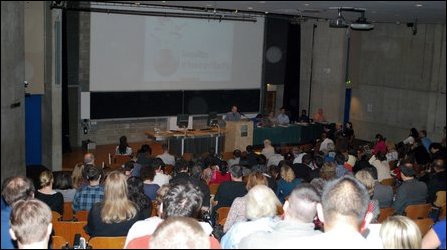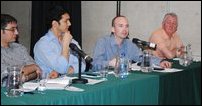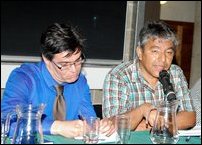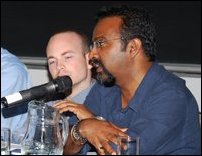2ND LEAD (ADDS PHOTOS)
Dublin conference on geopolitics highlights need for critical solidarity
[TamilNet, Friday, 25 May 2012, 23:40 GMT]
Activists from Kurdistan, Colombia, Ireland and the island of Sri Lanka, talking about the role geopolitics played in determining peace-processes and conflict in various cases, informed a mixed audience of activists, academics and journalists of the nuances of their respective cases connecting it with larger trends at an event organized at Trinity College, Dublin on Thursday. The public meeting titled ‘The Local and the Global: The Geopolitics of Peace and Conflict’, focussing on conflicts in Colombia, Kurdistan, Northern Ireland and Sri Lanka, elaborated on how different alignments of global interests influenced political outcomes at local levels. The conclusion of the conference saw the unanimous passing of a resolution that opposed the criminalization of political organizations like the FARC, PKK, LTTE that fought for political and democratic demands of peoples.
The conference also underlined the need for oppressed groups to have solidarity with each other and to critically study and learn lessons from each others’ movements.
“The dismantling parity of esteem and power balance between main parties in conflicts by the major powers has led into bloodbath in Colombia, Kurdistan and Tamil Eelam, and a global perspective is necessary for a just and peaceful resolution of these conflicts,” Jude Lal Fernando, lecturer at the Irish College of Ecumenics who was on the organizing committee of the event told TamilNet.
“International solidarity is essential for reinstating the power balance, without which peace and reconciliation would only be a dream,” he added.
Paul Murphy, MEP, Ireland, equating ‘global powers’ with ‘imperialist powers’ said that their role in conflict areas were disgraceful. Arguing that that most of the conflicts in the world now arise out of a denial of the right of peoples to self-determination, he stated that the roots of these conflicts can be traced back to imperialism and colonialism, and was augmented later by neo-colonialism.
Taking the case of Sri Lanka, he emphasised that there could be no genuine solution from a military approach to political conflicts, condemning the “genocidal approach” of the GoSL towards the Tamils to deny them their national question. He also said that the continuation of oppression would lead to a re-emergence of conflicts.
Making a case for an independent international inquiry into the war crimes of the Sri Lankan government and the right of self-determination of the Tamils, he stressed that “justice is the pre-requisite for peace.”
Likewise, he also criticized the Tamils’ hope on the IC in the belief that they would help them, noting that the global powers promises don’t translate into action and that they only raise false hopes among people. He contended that the Tamils should reach out to the poor sections of the Sinhalese, also repressed by the GoSL, to forge a common struggle and also to work with the “real International Community” – trade unions, peace activists, civil liberties organizations etc.
Speaking about the geo-political factors that were responsible for the genocide of the Eezham Tamils, Rohitha Bashana Abeywardane, exiled Sinhala journalist, said that “Geo-political reasons were always suppressed in the mainstream media.” He credited this to the vested interests of world powers in preserving the unitary structure of the island. “No one talked about the killing fields in the making from January 2009 to May 2009,” he said, noting that UN officials, including Gordon Weiss, knew the scale of the massacre to happen in the GoSL’s assaults on the Tamil people but chose to remain silent. All the powers were united that the truth in Sri Lanka shouldn’t go out “until the job is done”, he said.
Using power-point presentations to highlight the geo-strategic location of Sri Lanka in the four main sea lines of communications, he noted that the position of Sri Lanka between Malacca straits and the straits of Hormuz made its structure of great importance for world powers, and the Eezham Tamils who were trying to divide it in the course of their struggle had to brutally crushed, because Sri Lanka is geo-strategically important only as long as it is a unitary political entity.
Giving an explanation for genocidal massacre of the Eezham Tamils, the Sinhala journalist said, citing British counterinsurgency expert Frank Kitson, when you want to neutralize an insurgency movement, you must destroy its “genuine subversive element” – arguing that the genuine subversive element in the island was the Tamil population as such.
Mehmet Yuksel, Kurdish politician and human rights activist, spoke on the prolonged assault on the Kurdish identity, referring to the assimilation of Kurds in Turkey, Syria and Iran. In the case of Turkey, he noted how Kurds had to use 2 names, the Turkish in public and the Kurdish in private, and also how Turkey was systematically changing the names of Kurdish towns and cities.
Of late, the Kurdish existence was recognized but their political rights were denied, he observed, arguing that Turkey thought that they will lose their geo-political position if they give Kurds their rights.
Mr. Yuksel also spoke of the repressive measures taken by Turkey, with the presence of over 12,000 Kurdish political prisoners, of whom more than 2000 were children. The political prisoners included mayors and elected Kurdish politicians for simply speaking about their democratic rights. He noted that the Turkish state used the argument of ‘terrorism’ to clamp down on and arrest Kurdish activists. He also said that repression of journalists by Turkey was worse than China.
Carlos Arturo Garcia Marulanda, a member of Patriotic March, the largest peace organization in Colombia, spoke about how neo-liberal policies of the Colombian state and the influence of multinational corporations worked against the interests of the people and involved the use of repressive measures against movements for social and economic justice.
Stating that peace in Colombia needs to go hand in hand with social justice, Mr. Marulanda opined that such a peace required a democratic debate of structural problems and overcoming the major national problems that the Colombian people faced.
Referring to assassinations of leaders and activists of trade unions and social movements, forceful displacement of peasants by the military and paramilitaries and land grabbing for the benefit of MNC’s, a “political genocide” against indigenous people, the Colombian activist stressed that the only solution to the conflict lay in a democratic political dialogue, that also recognized the need for structural changes and also truth, justice, reparation and the guarantee of non-repetition to victims of state violence.
In a short speech, the Colombian Ambassador to the UK Mauricio Rodriguez Munera claimed that the Colombian government was interested in peace and development.
Joe Castello TD, Ireland’s Minister of State at the Department of Foreign Trade and Affairs, and Paul O’Connor, Irish activist at the Pat Finucane Centre, spoke about the conditions around peace process in Northern Ireland. Mr. O’Connor put forth the idea that a state which is a participant to a conflict cannot give a just solution to it, and made a case for an effective international participation.
David Landy, activist from the Ireland-Palestine Solidarity Campaign, touched on how one form of state oppression influenced others, referring explicitly to Israeli politicians suggesting a ‘Sri Lanka solution’ to control Gaza. He also spoke of the importance of solidarity groups among oppressed peoples.
The public meeting was part of a two day conference on understanding the commonalities in geopolitics in the specific conflict zones. It concluded on Friday with a resolution condemning the criminalization of political organizations that demanded political and democratic rights for people like the FARC, PKK, LTTE and others.
The event was organized by Irish School of Ecumenics, Irish Forum for Peace in Sri Lanka, Grupo Raices Colombia Solidarity in Ireland, Kurdish Association of Ireland and Latin American Solidarity Centre in Ireland. The meeting was moderated by Dr. Iain Atack, lecturer at Trinity College.
Related Articles:08.03.12
Promote Dublin report, build solidarity, recognize Self-Dete.. 26.02.12
Peace academic denounces US-LLRC formula, urges alternative .. 16.01.10
Dublin verdict: Sri Lanka guilty of War Crimes











